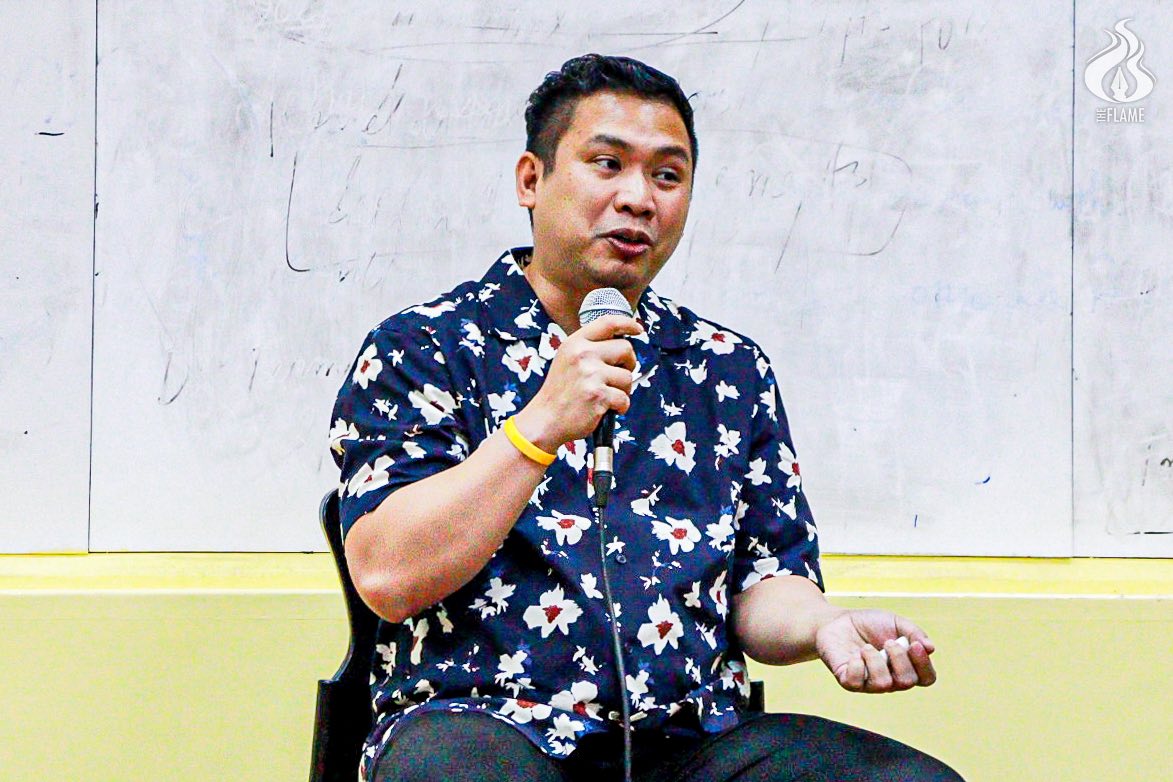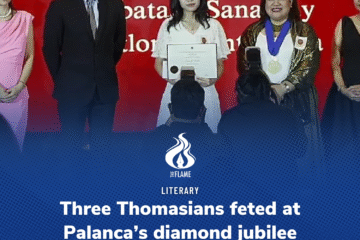
WRITERS SHOULD always undertake meticulous research and immersion when crafting stories laced with advocacy, an award-winning playwright said.
In his lecture titled “Center Stage: Ang Iba’t Ibang Mukha ni Juan sa Entablado,” playwright Maynard Manansala recounted his close encounters with the drug war victims and their families in 2017 and how he brought their stories from the shadows to the stage.
He also revisited his first experience with playwriting through “Matyag,” a collection of plays he wrote with author U Z. Eliserio and Creative Writing Assoc. Prof. Chuckberry Pascual published in 2010.
The playwright emphasized the importance of having peers who write and how it served as one of his driving forces during college.
“Nasa kolehiyo pa lang kasi kami, sila na ang umaya sa akin magpasa sa ganitong workshop, o sa ganitong publication… Sila ang dahilan kung bakit kahit paano, may pinupuntahan ang aking mga akda,” Manansala said on Thursday, March 27, at Room 117 of the St. Raymund de Peñafort building.
(“When we were in college, they were the ones who encouraged me to submit [my work] to workshops or publications… They’re the reason that my works were somehow getting somewhere.”)
Transitioning from his humble beginnings in playwriting, Manansala delved into how he broke away from writing collaborative plays to writing independently. He discussed the inspiration behind his play collection “Tao Po: Samot-Saring Tao sa Dula” and the different faces of society represented by his characters.
He spoke about the challenges of drawing from personal experiences and channeling different voices by taking inspiration from other people, particularly when he began to take an interest in writing about extrajudicial killings (EJK) in 2017. Comedienne and activist Mae Paner, who played the character of Juana Change in Tao Po, invited him to write about it at the time.
Although he had already written plays with harrowing themes, the playwright recalled his intensive process while creating Tao Po, one of his most notable works. He admitted taking on the challenge without considering the implications of writing a play with a strong advocacy message.
“Dahil freelance writer naman ang drama ko noon, basta na ako um-oo. Pumayag ako na hindi ko lubos naiintindihan ang implikasyon ng dula na may bitbit na adbokasiya,” he said.
(“Since I was a freelance writer then, I just agreed. I agreed despite not fully understanding the implications of a play that carried an advocacy.”)
According to Manansala, Juans and Juanas are ordinary people whose lives are left undiscovered simply because society tends to overlook their being.
From interviewing families of EJK victims in San Juan to joining nightcrawlers on their missions, Manansala immersed himself in rigorous research. He pored over documentaries, articles and transcripts to authentically portray the Juans and Juanas he sought to shed light on in his play.
“Ganito ang proseso na pinagdaanan sa pagtatangka na mabigyan ng mukha sa entablado ang libo-libong Juan, Juanang nanghihingi ng pagkatao sa mundo,” he said.
(“This is the process that [I] went through to attempt to give a face to the thousands of Juans and Juanas on stage who are asking for humanity in this world.”)
Manansala highlighted how theater is a place where “one is not alone and can never be alone.”
“Ito ang espasyo at oras para kilalanin ang mukha ng iba’t ibang Juan o Juana lampas sa kanilang anyo, kulay, at kilalanin ang mga namumunting kuwento sa ilalim ng mga ito,” he added.
(“This is the space and time to discover the face of the different Juan or Juanas beyond their appearance, color, and to recognize the stories that lie within.”)
In 2018, Manansala was awarded the Carlos Palanca Memorial Award for “Tao Po.” The play’s film adaptation later received two nominations from the Young Critics Circle in 2022 for Best Screenplay and Best Performance for Paner.
Manansala’s lecture is the third installment of “MaKathAklatan: An Author Lecture Series,” an event organized by the UST MaKatha Circle for Filipino authors to discuss their notable works. F



